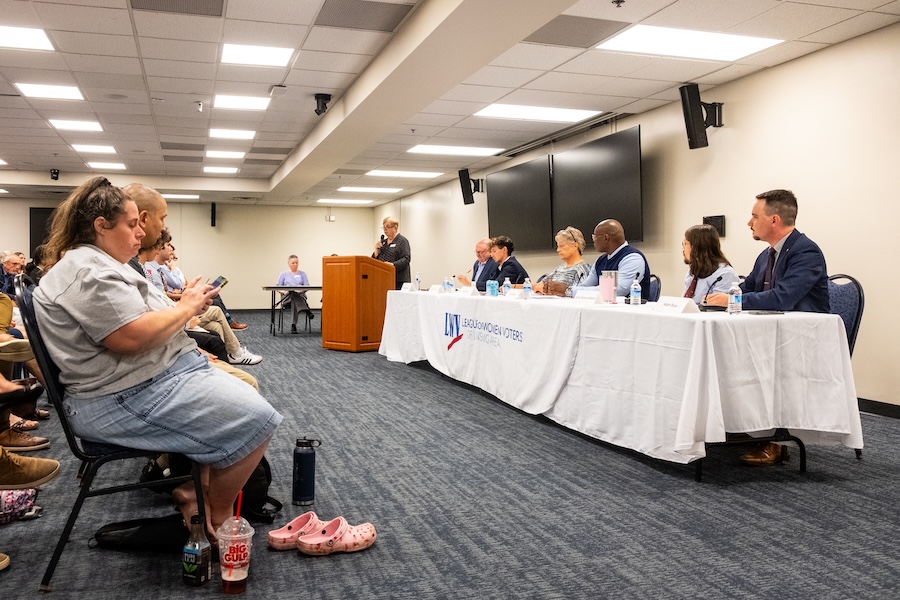Council Candidates Talk East Lansing’s Sanctuary City Status, Downtown Safety, Budget and More at Candidate Forum
The six candidates competing for two seats on the East Lansing City Council tried to set themselves apart at a candidate forum held at the Hannah Community Center Wednesday, Sept. 17.
The forum, which was co-hosted by ELi and the League of Women Voters of the Lansing Area, saw candidates give opening and closing statements and respond to seven questions that addressed everything from the city budget to policing and more. Candidates had 90 seconds to answer each question.
Along with the written summary provided here, voters are encouraged to watch the roughly 90-minute forum in its entirety.
Candidates relay ideas for fixing the city budget.
Most candidates said there are areas in the city that can be developed further to help grow the city’s tax base.
Kath Edsall, who currently serves as the vice chair of the city’s police oversight commission, said that 60% of the city’s general fund is spent on public safety, and city leaders need to see if there are cost-saving opportunities in police and fire budgets.
“You can’t just look at the small departments and try to make up a huge difference,” she said, adding the city should review the costs that come with the expensive defined benefit retirement packages offered to police and fire department employees.
“We’ve been hands off on that for years even though its been talked about for two decades,” Edsall continued. “Realistically, we can’t continue to remain hands-off in those areas of our budget.”
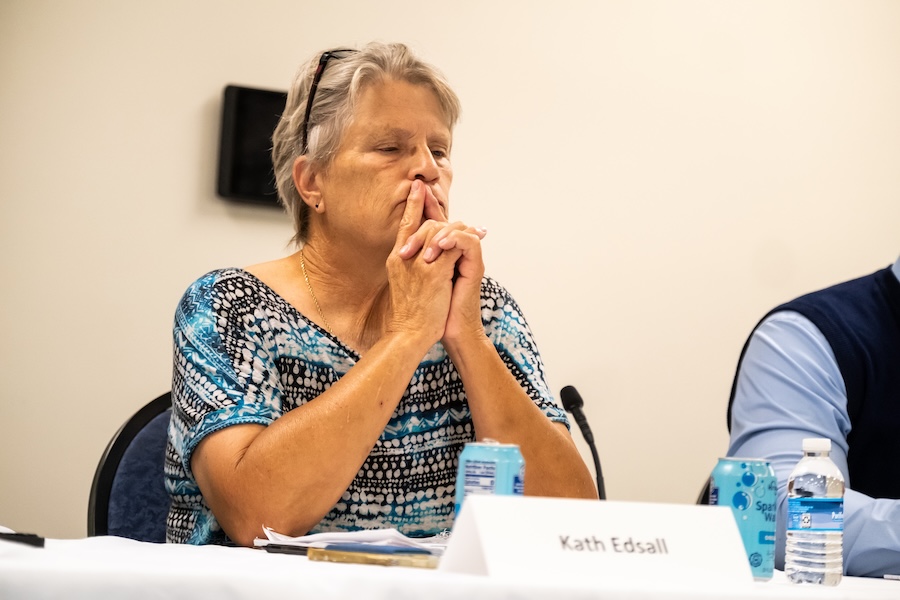
Joshua Ramirez-Roberts, who works for the state retirement office, agreed that looking at the benefits city employees receive is important.
“I work for the state, we got rid of pensions in 1997,” he said. “It’s always something to be looking at.”
Adam DeLay said the city needs to zero in on eliminating unnecessary spending, citing specific expenses recently approved by council.
“Let’s take a look at the last two [council] meetings and let’s see what the city did,” DeLay said. “A $50,000 contract per year for lobbying services with the state government. I do not think the City of East Lansing needs to spend that amount of money when we have a senator and two representatives. $50,000 more for their labor attorney – right there, one meeting, $100,000 that we could cut or reduce.”
Candidates share their views on development in the city.
There was a consensus among candidates that housing is too expensive in East Lansing and it is preventing some people from being a part of the community.
Three candidates mentioned the Student Book Store Owner’s idea to build “The Howard,” a 14-story apartment complex that includes retail space. Chuck Grigsby, Liam Richichi and DeLay each either stated support or strong interest in the development.
Each candidate said there is a need for a more diverse set of housing options in the city, with Ramirez-Roberts advocating for condos to be added, DeLay suggesting duplexes or triplexes and Richichi saying there is a shortage of housing for young people.
Steve Whelan and Ramirez-Roberts each said they believe the city should explore redevelopment opportunities in the Cedar Village area.
“That’s an area that we know causes a lot of problems,” Ramirez-Roberts said. “It’s also a lot of older buildings and we could get some growth there.”
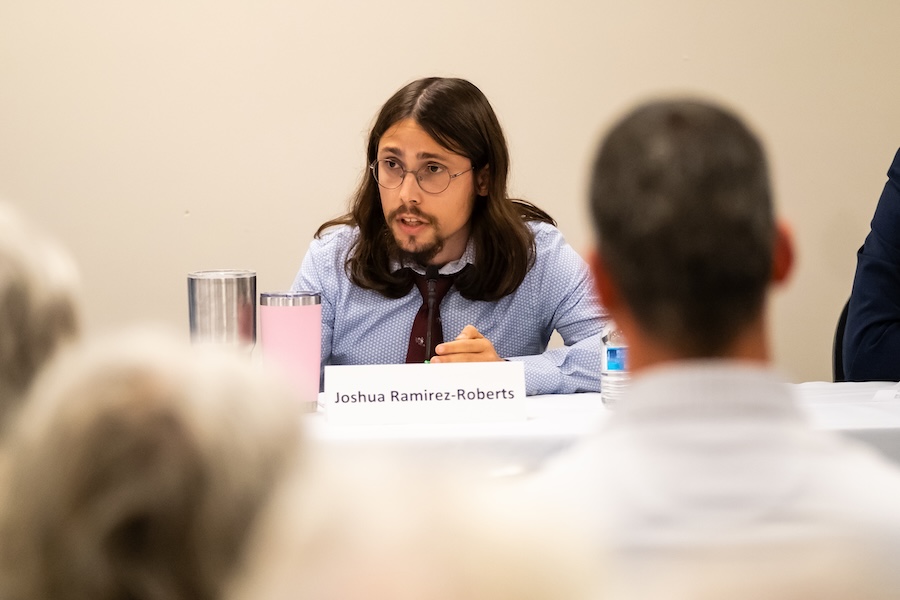
Candidates give their views on addressing downtown violence.
Candidates each agreed that the pattern of violence downtown needs to be addressed, but there were differing views on what City Council can do to address the problem.
Whelan, who recently retired after a 25-year career with the East Lansing Police Department, said a lot of the issues with violence are due to people being funneled to the same area downtown when bars close at 2 a.m. He said the city could look into ordinances that could get people to go home after the bars close.
“There’s several bars that close earlier than that just so the people from their establishment don’t deal with the violent situation,” he said.
Richichi said the city should work with Michigan State University to address the problem. He said the university could send more of its police officers downtown.
“We have an ideological border wall, some of you may know it as Grand River Avenue,” he said. “Bridging this gap between MSU and the city, the two of which exist in a symbiotic relationship, is so important to me.”
Grigsby acknowledged the city’s budget troubles, but said it might be worth it to spend money to add police officers.
“Right now we’re just not able to handle what’s going on downtown, I think it’s going to get worse,” he said. “Students are only going to get a little bit more wilder each year as they come in when they start to get away with certain things that happen down there.”
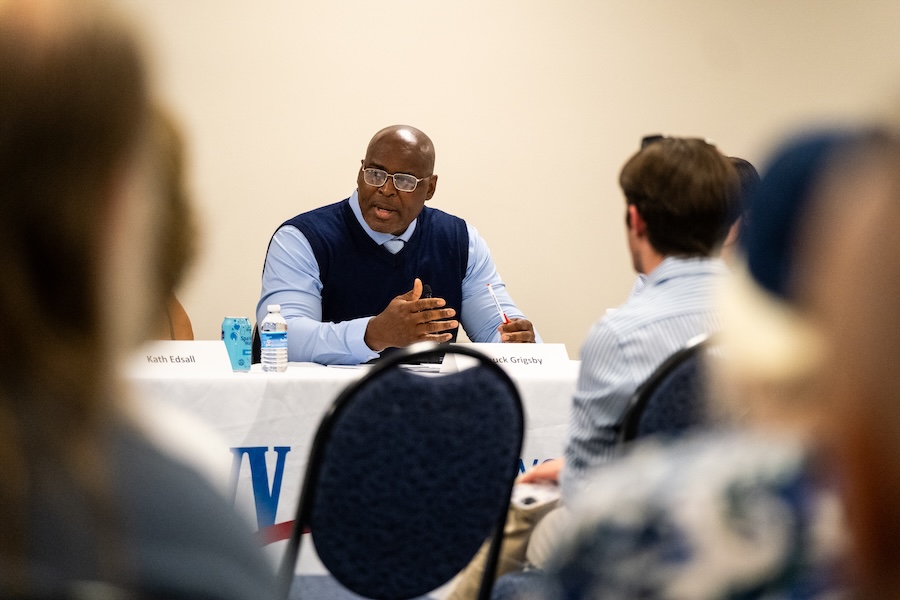
Ramirez-Roberts and DeLay each said the downtown needs more things to do so that large crowds aren’t all concentrated in front of the bars. DeLay suggested allowing food trucks in other areas of the city, so people will go to the trucks after they leave the bars.
Multiple candidates said they think ELPD could improve its crowd control tactics. Edsall said the police oversight commission recently requested ELPD’s comprehensive crowd control plan, but has not yet received a response.
“It feels like there is no plan,” Edsall said. “When we see body-worn camera footage and footage from TikTok and so forth, it feels very unplanned, which increases the lack of safety for everyone involved downtown.”
Candidates have differing views on East Lansing’s sanctuary city status.
While candidates agreed that East Lansing should be a welcoming city to undocumented immigrants, views differed on the city’s “Sanctuary City” designation.
In 2023, City Council passed a resolution declaring East Lansing a sanctuary city. Earlier this year, the Department of Justice released a list of sanctuary jurisdictions that may be punished by the federal government. East Lansing was the only Michigan city included in the list.
Three candidates: Edsall, DeLay and Grigsby said they support keeping the sanctuary city title. Ramirez-Roberts said he thinks the designation could make the city less safe for immigrants. Richichi and Whelan each said they favor East Lansing being a “Safe Haven” city, a designation East Lansing held from 2017-2023.
Under the Safe Haven status, police officers never asked about the immigration status of people pulled over or arrested for minor offenses, Whelan said. He worries that the sanctuary city title acts as a promise that the city cannot deliver on.
“My challenge with the sanctuary city [title] is, it really comes across as a promise that we’re going to house you, we’re going to protect you, we’re going to offer you services,” Whelan said. “I think there’s unintended consequences with a promise that we can’t keep. There’s not one dime in the budget designated to sanctuary cities.”
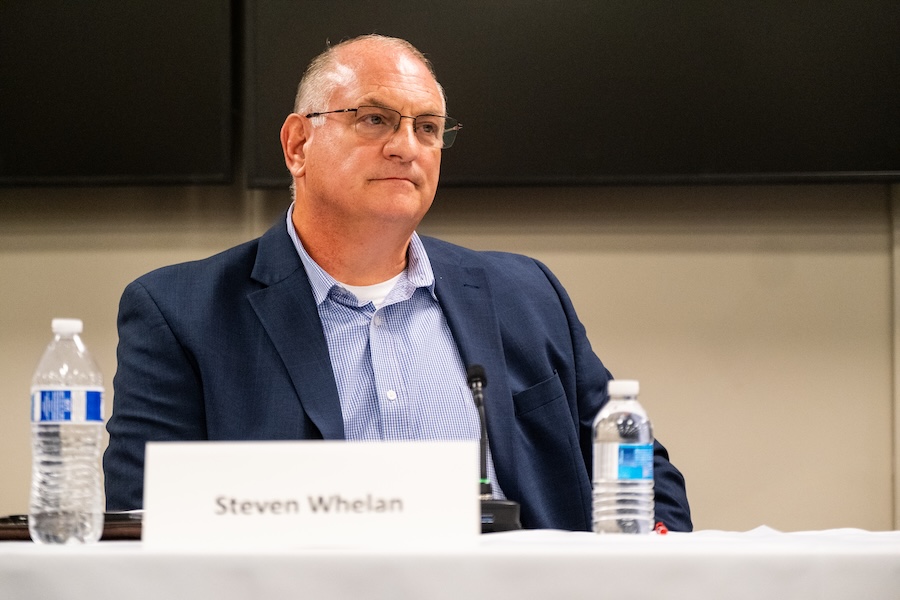
Richichi said the safe haven designation allows the city to be welcoming to immigrants, without putting state and federal funding at risk.
Edsall said the sanctuary city status does offer more protection for undocumented immigrants and that she would not go back on her morals and vote to have the resolution overturned.
Grigsby said he favors the sanctuary city status because the city should not be using police resources on immigration enforcement.
“We’re not going to use the little resources we have to promote something that we don’t morally support,” he said.
Ramirez-Roberts said he opposed the sanctuary city resolution when he was on the University Student Commission years ago.
“I’m Mexican, if ICE [Immigration and Customs Enforcement] was around, you know, doing their thing 80 years ago, I wouldn’t be here,” he said. “Because my… great grandparents were never citizens.”
Ramirez-Roberts said the sanctuary city title being added was “performative” and didn’t result in actual policy change. It did, however, “put a target on our back and put a target on the backs of the immigrants that live here.”
Candidates oppose Parks and Recreation Millage.
Along with picking new City Council members this November, voters will also decide whether or not to approve a new property tax millage. If approved, the roughly $3 million raised annually by the millage will replace the general fund’s contribution to the parks department and insulate the department from potential cuts.
Not one of the six candidates signaled they favor the millage. The only candidate who did not outright state opposition to the millage was Whelan, who said he does not think candidates should “put their thumb on the scale.” Whelan continued to say he thinks residents are overtaxed and it’s concerning that the millage may increase the property tax cap put in place when voters approved the income tax.
Some of the sharpest criticism about the millage came from DeLay, who serves on the city’s Parks and Recreation Advisory Commission. He said the city is using parks funding as a “hostage” to make up for city officials’ mistake of illegally taxing residents through Lansing Board of Water & Light bills.
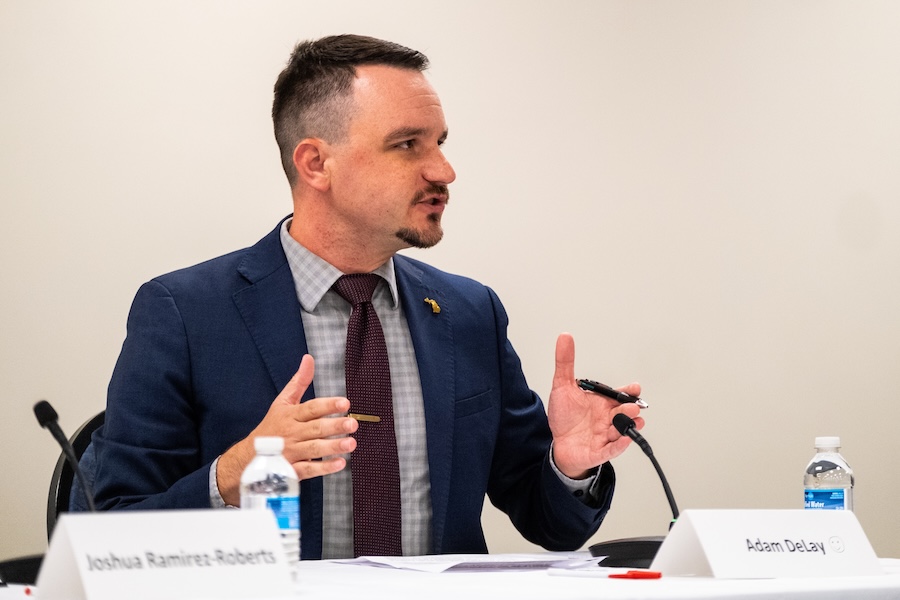
“It is about trying to scare the citizenry into voting yes on a ‘parks millage’ that is masquerading as a general fund property tax increase,” DeLay said. “I do not support that.”
Candidates give input on how the city could address the growing population of homeless people.
Candidates advocated for taking a compassionate approach to addressing unhoused people downtown, as both Ramirez-Roberts and Grigsby condemned Lansing for “criminalizing” homelessness.
Richichi said homelessness is a problem the city cannot solve on its own, and city leaders must work with state and local partners to house people, help them find jobs and integrate them into the community.
DeLay and Whelan both praised the city for hiring police social workers that assist homeless people in the city. DeLay said there are many state and federal programs available to assist homeless people, but they need help to access these programs.
Edsall said the city should explore working with partners within the county to have mental health professionals and others who operate separately from the police department help unhoused people, so their condition is not criminalized.
Grigsby said there are faith-based communities in East Lansing that help homeless people, and the city should consider partnering with these groups.
Candidates share their views on the city’s police oversight commission.
While no candidate called for the elimination of the city’s police oversight commission, candidates hold a diverse set of opinions about what the commission’s role should be.
Edsall said that as a member of the oversight commission, she feels strongly it’s important that the community is able to determine what local policing looks like.
Whelan said he does not have a problem with the oversight commission and good police officers are not afraid of accountability. He said the commission needs to be made up of members who are not biased against the police.
“In my 25 years, I have not witnessed an instance where an ELPD officer has treated a person with explicit bias that affected the handling of the instance or the interaction,” Whelan said. “Likewise, we need commissioners that do not publicly rush to judgement, revealing their biases against law enforcement as a whole.”
Richichi said he has heard a lot of complaints about an ordinance passed that directed police to not pull drivers over for having a loud muffler, and that the oversight commission should not hinder enforcement efforts.
Edsall clarified that loud mufflers are just one part of a larger ordinance that aims to reduce bias in policing by eliminating pretextual stops. She said loud cars are a problem, but the issue should be addressed through the city’s noise ordinance.
Grigsby, who chaired the study committee that created the oversight commission, said he supports the oversight commission and he believes it improves policing in the city.
Ramirez-Roberts said many of the complaints he’s heard about the oversight commission have been directed at individual commissioners, not the commission itself. He added that the having an oversight body does not keep police from doing their jobs.
“You can have the police oversight commission, you can also have enforcement,” Ramirez-Roberts said. “Those aren’t two things that live in two separate worlds.”
DeLay said that before the commission was created, many community members felt they did not get enough information about the police department.
“We can want enforcement but also have high standards and oversight,” DeLay said. “I think this is an issue that the temperature has gotten way too hot on and I think that many members in the community need to calm it down.”
Candidates give ideas about how to address youth behavioral issues, especially at the public library.
Many candidates said behavioral issues are rooted in the lack of spaces kids have to go after school and suggested utilizing the Hannah Community Center for after-school programming.
Richichi said the city should have employees engage with some of the kids causing trouble at the library to find out if there are other things they would rather be doing, if financial barriers are preventing them from participating in programs and if they have challenges at home that they need assistance overcoming.
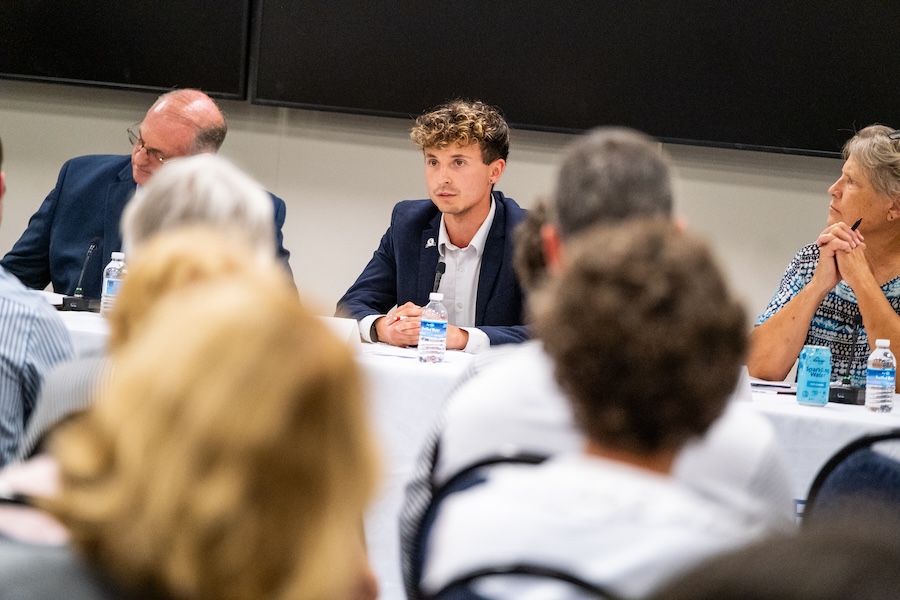
“I think it’s important to recognize that none of here are these students,” he said. “I think this comes back to the issue that we face in this community a lot, which is we rely on expensive lobbyists and consultants to give us the answers we should be going directly to the people for.”
Edsall said the city should consider reopening the teen center that used to be housed at the community center. She said the only choices kids have after school are participating in a tutoring program or going to the library.
“The problem with both of those is that these are kids who have been shushed all day long and then they go to environments where they’re being told ‘sit still’ and ‘shush’ and ‘read a book,’” Edsall said. “We have to provide other opportunities for children after school.”
Grigsby said he used to volunteer at the library and he often worked with young people in that role. Even though he has a long work history of engaging with high-risk youth, the work at the library was difficult.
“The library is not the place for them to be,” he said.
Grigsby and Richichi each said creating an Emerging Leaders program for young people would be helpful.
Ramirez-Roberts said the city should utilize grant funding to pay fees that can be a barrier to after-school programming for some children. He also suggested recruiting students to programs if they are having behavioral problems.

